Dirty Dancing 's Jennifer Grey on the enduring relatability of 'I carried a watermelon'
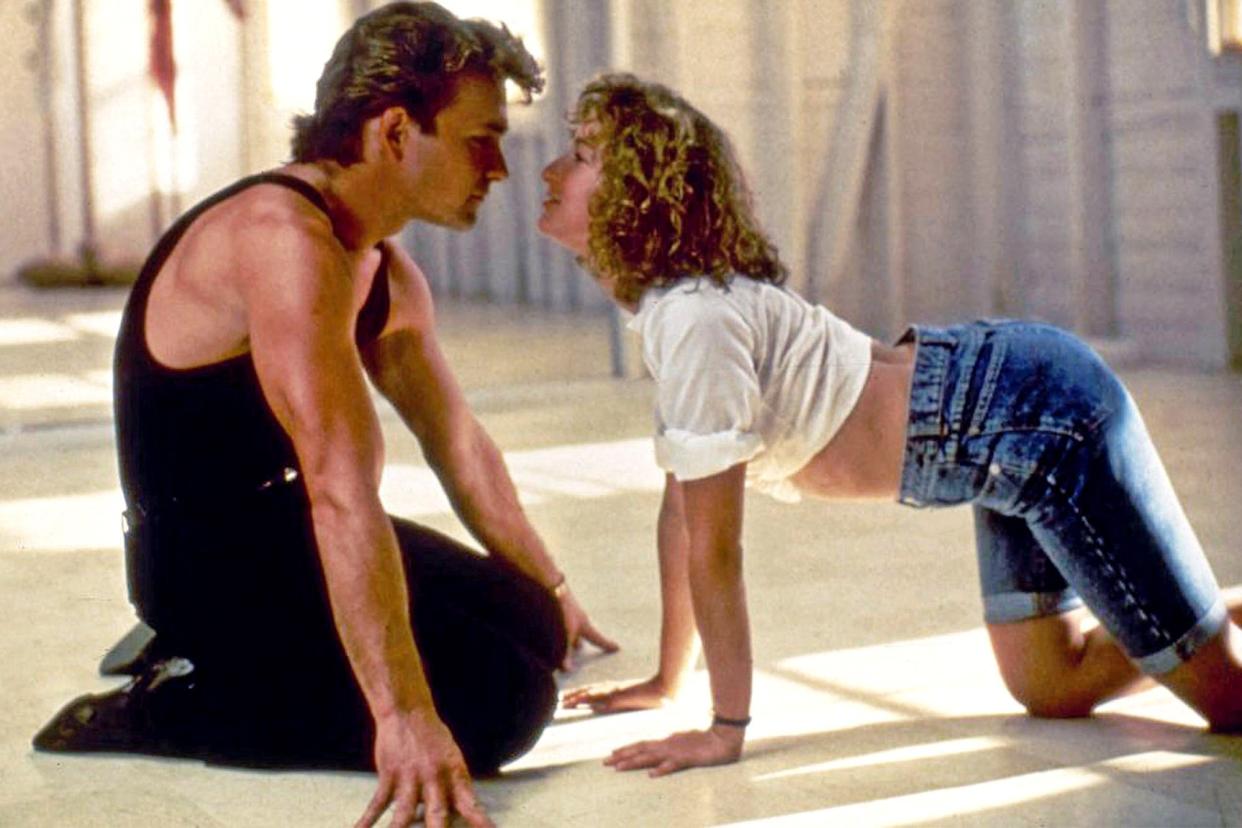
- Oops!Something went wrong.Please try again later.
- Oops!Something went wrong.Please try again later.
- Oops!Something went wrong.Please try again later.
Thirty-five years ago this Sunday, thousands of Americans went to see a little rom-com called Dirty Dancing. Shot for a modest $6 million, the music-driven love story between idealistic teen Frances "Baby" Houseman (Jennifer Grey) and hot-blooded dance teacher Johnny Castle (Patrick Swayze) had audiences swooning: Dirty Dancing spent nearly six months in theaters and has since grossed over $63 million worldwide.
Decades later, we still — painful pun alert — have the time of our lives watching (and talking about) Dirty Dancing. And it was a great delight to learn that star Jennifer Grey still loves to talk about the movie, too, not just sharing her memories, but offering thoughtful analysis of the film's "stealth" feminism. On a recent Wednesday afternoon, Grey called EW and graciously allowed us to monopolize far too much of her time discussing all things Dirty Dancing, including the movie's meaning in a post-Roe world, what's happening with the upcoming sequel, and why Baby's "I carried a watermelon" moment resonates so deeply to this day.
ENTERTAINMENT WEEKLY: I hope you're not tired of talking about Dirty Dancing.
JENNIFER GREY: I actually am not. You know why? Because there are so many layers to this movie. There is so much goodness under what feels like a fluffy rom-com fairytale. There is so much depth in the structure of the characters, and the relevance to what's going on right now.
We were writing about abortion and illegal abortions. The movie is a period piece, so it takes place in 1963 and we were shooting it in the late eighties. It's a very unusual trope, it's not your usual device used in a lot of rom-coms, right? It's pretty heavy duty. And the fact that it doesn't ruin anyone's ability to be swept up in this yummy story of sensual delight — you'd think it would be a buzzkill, right?
I'm the person responsible for this story right now, because I'm maybe one of the last living people who [starred in the film]. I don't want to have nothing to say when I'm asked, and I don't want to be bored, because I think that's a wasted moment. So then I think, "Well, what is there here?" And then I just start to go deeper. And I realize the movie is giving me more, the more I ask of it.

Vestron/Kobal/Shutterstock Patrick Swayze and Jennifer Grey in 'Dirty Dancing'
Screenwriter Eleanor Bergstein has said that she got pushback for including Penny's botched abortion in the script, but she fought to keep it in. Do you recall any discussions about it on set when you were making the film?
My memory's not perfect because it was so long ago, but I have no memory of that. I was looking at it just from the standpoint of an actor — how to find the through line of a character. What Eleanor gave us was this very deep scaffolding. It's a feminist movie, but it's very stealth. It's got stakes that are high, and it's talking about social justice, and they're dealing with class issues, with the haves and the have-nots.
It's a very serious exploration of what it was for Eleanor Bergstein growing up in 1963, and in this context, at Kellerman's, which is a specifically a Jewish resort. These Catskills resorts were created because Jews were not welcome in many of the other resorts. This whole culture was developed to give Jews a place to go. And what happens is, it's like this flip: The people who are working at the resort are white people and Latinx people, right? But they are not Jewish, and they are "the help." There's a lot of interesting Upstairs, Downstairs going on.
Even though Penny was a white woman, she was a working-class white woman who did not have access to good healthcare. And here we are with Baby's dad, who is a first-rate doctor. What you're seeing is a girl who's a virgin, but she basically considers that her role is taking care of the underserved. That's what she was bred to do. And the reason she was bred to do that is because she believes that she is one of those people who is not going to get the guy. So what happens is, Baby comes in and even though she's never had sex, she believes her job there is to help this person who needs her help.
To me, the fact that the person who is a virgin is the one who is helping someone get an illegal abortion because she sees how unjust the system is, she sees how wrong it is — it's the call to action that makes it possible, makes it essential for her to then fall in love with Johnny. To me, there's some genius to the way Eleanor constructed the plot. There's a lot there.
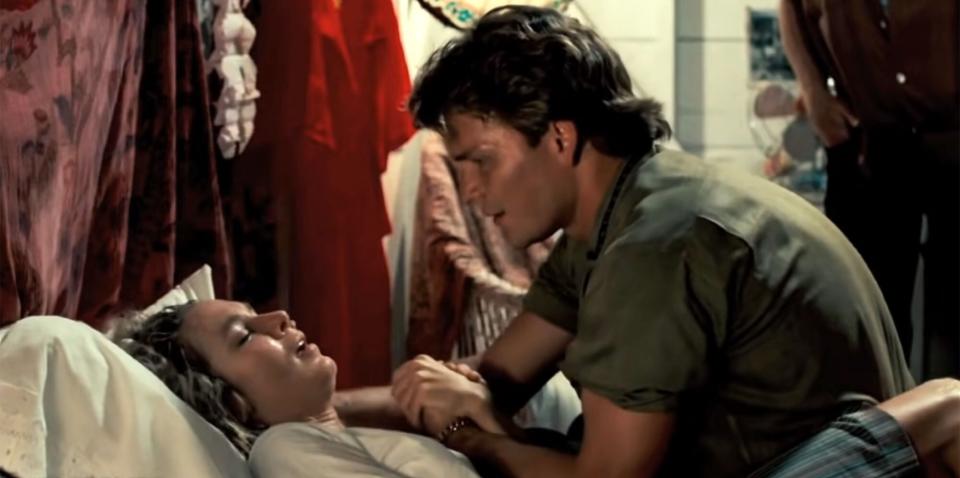
Lionsgate Cynthia Rhodes and Patrick Swayze in 'Dirty Dancing'
Not only is it surprising to see an illegal abortion in a rom-com, as you pointed out, but the movie also does not shy away from the brutality and danger of a botched abortion.
One hundred percent. It's terrifying, and it feels so real. It's the last thing you think you're going to see in this movie. Young women, especially when they're coming of age, their fertility is off the charts and yet their brains haven't come online yet. They don't have [a fully developed] prefrontal cortex and they won't for years. We have laws that penalize nature — and the laws are made by men who have never known what is to lose their career, or see their dreams of a future life cut short.
When we made this movie, it was never in anybody's wildest imaginations that this would ever resurface as a threat to all women, and to the doctors who would help them. These doctors, their whole job is to save people's lives and to take care of people — and then to turn it into a legal issue is madness. I can't think of too many rom-coms that have this much grist for the mill.
As for the haves and have-nots theme, Robbie [Max Cantor] really drives that home when he tries to get Baby to read The Fountainhead: "Some people count, some people don't." Had you read Ayn Rand's book when you made the movie?
I can't remember. I think my best friend was reading it, and then I was reading it, but I don't know if I ever [finished it]. It wasn't my thing. I knew what the reference was. I knew what Robbie represented as an archetype, and I knew what Baby represented as an archetype, as the voice of the people. She decides it's her job to defend this whole community of people that are just considered less-than because they're not the privileged [class]. The scene just really establishes her values and how she was raised, and how he was raised. She has this deep desire to speak up.
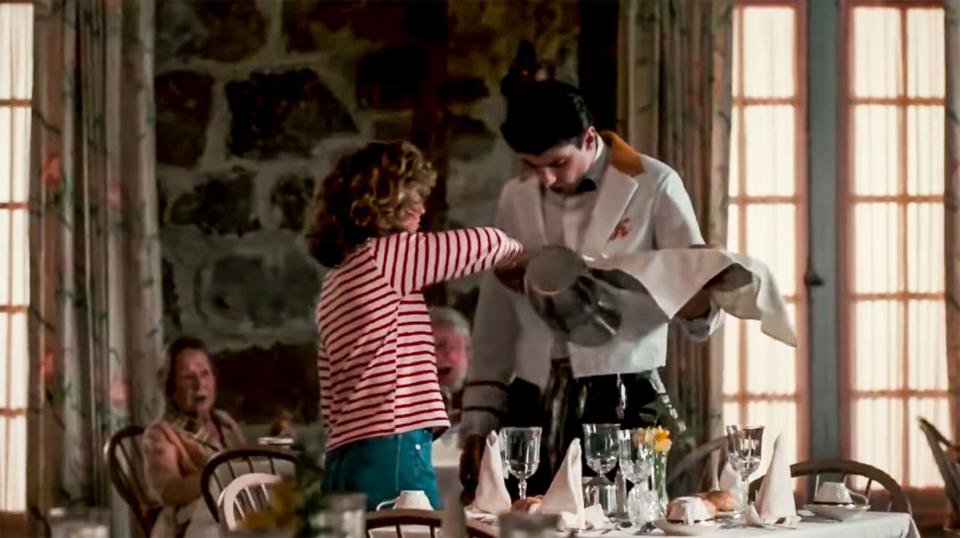
Lionsgate Jennifer Grey and Max Cantor in 'Dirty Dancing'
In your memoir, Out of the Corner, you write that there was a long-running contest on the set to come up with a new title for the movie, because no one thought that Dirty Dancing would fly.
It literally was like, "Oh, no, that's never gonna happen." There was no runner-up. I remember going to a psychic, and she said to me, "Oh, it's going to be called Dirty Dancing." I was like, "No, it's not." She goes, "Yes, it is." And she goes, "And there's gonna be a song that's going to be huge." I was like, "Okay?" [Laughs]
Let's talk about "I carried a watermelon." Baby's awkward declaration is one of the most famous lines in the movie. Why do you think people connect so strongly to this moment?
I think that the specificity of the feeling of intense shame, when you say something really dumb — especially because you're so freaked out and because someone's so cute. You just wanna die or have a trap door open. That feeling, that human feeling, is so universal. The idea of just wanting to look good and just feeling like, "Oh, now I've done it. Now he'll see I'm worse than he thought. I'm like a freaking idiot." That self-sabotage, like, "Oh God, he can see what a geek I am. Aaaaaah!"
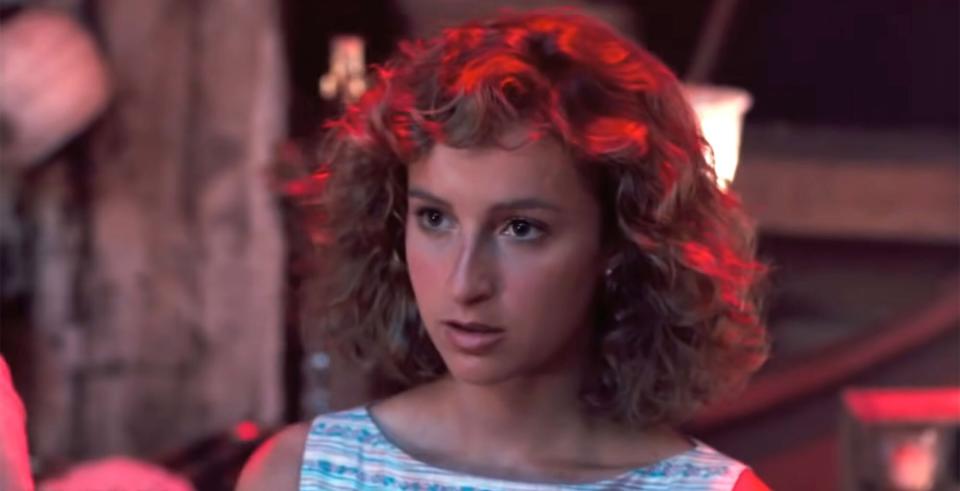
Lionsgate Baby Houseman (Jennifer Grey) has her mind blown
Your daughter, Stella, is now in her early 20s. Has she seen the movie? And if so, what did she think of it?
I think she saw it once. She did not like and it and did not want to watch it again. I don't know if she ever watched it again. [Laughs] She did not want see me dancing with anybody but Daddy and it bugged her.
She read my book, and that was the biggest thing for me. I wanted her to know what I went through before she was born, because most kids don't know what it was like for their parents when they were struggling, when they were dating, when they were heartbroken, when they were betrayed, when they couldn't make a living, when nobody thought they would ever make it, and they thought they would never make it. It was really the reason I wrote the book, because I wanted her to have a kind of owner's manual about where she came from. In my opinion, it's really important for people to understand the generational trauma and stories that preceded your existence.
For her to read it and get it, and then she would quote things back to me that were helpful to her — I said, "You read it?" And she goes, "Mom, I'm so proud of you." I was like, "This is the best thing that's ever happened to me."
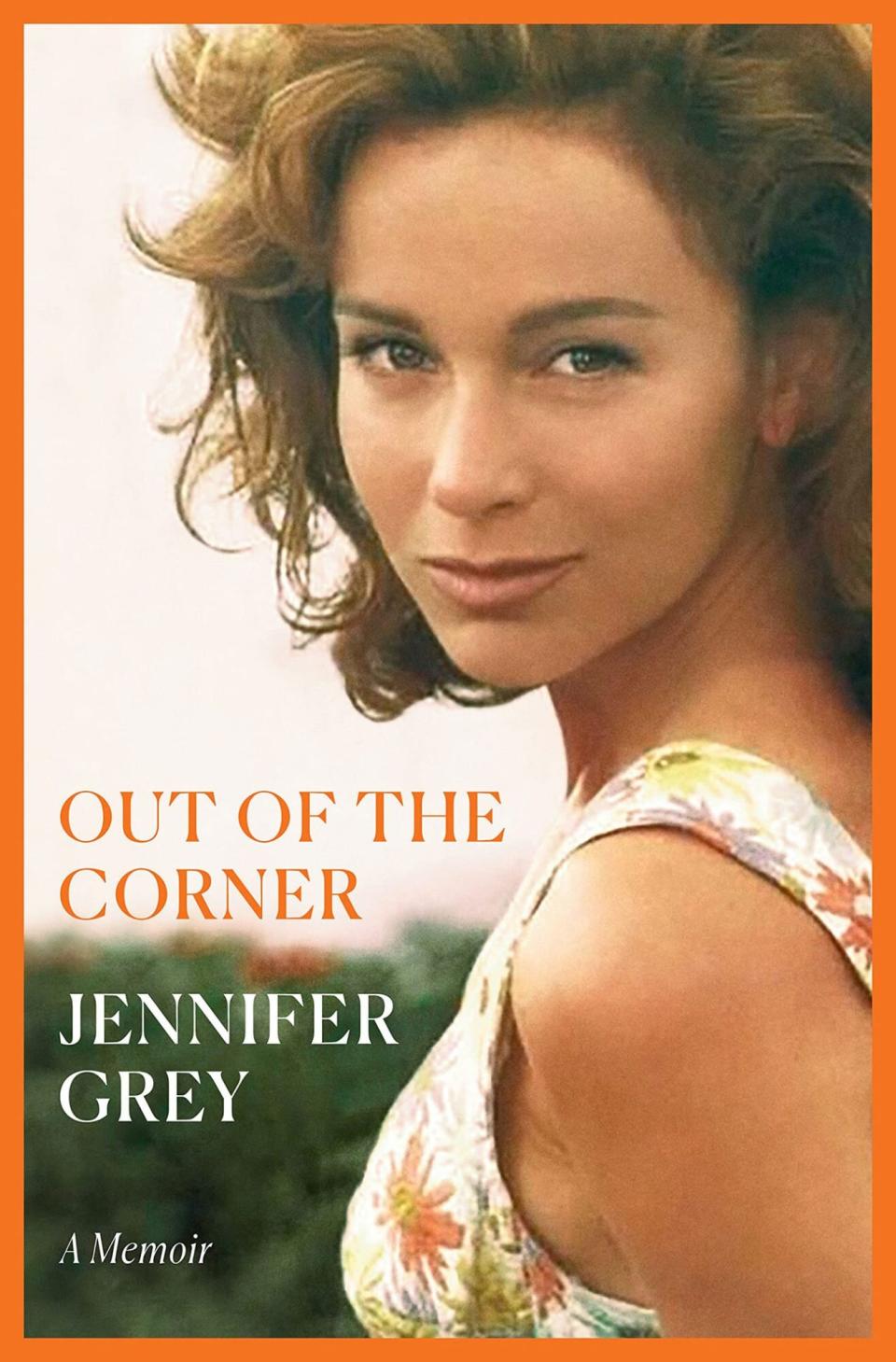
Out of the Corner by Jennifer Grey Publisher : Ballantine Books
In April, Lionsgate announced that you'd be returning for the "next chapter" of Dirty Dancing. What's the latest on this project?
I can't tell you much, sadly, but I will tell you that it will involve Baby. It will involve Kellerman's. There will be music. Unless there's a lot of CGI, Baby's going to be a little older. [Laughs] It's going to be Kellerman's, music, dancing, love story, romance. I'm just so super committed and invested in making it a fresh [take]. What happened happened, and that will never happen again. There will never be another Johnny. There will never be another Patrick. This sequel has got to be its own standalone piece. It's very tricky.
Is there a script?
Oh, yeah. There's a script, we're working on the script. We're going to shoot it in the spring of 2023, and it comes out on Feb. 9, 2024. So, I guess it's happening!
Can you tell us if the sequel will shoot at the Mountain Lake Lodge in Virginia, where the original film was shot?
I can't tell you that [officially], but I can tell you that [the movie] will involve Kellerman's, so I would guess some of that is yes.
This interview has been edited for length and clarity.
Related content:
